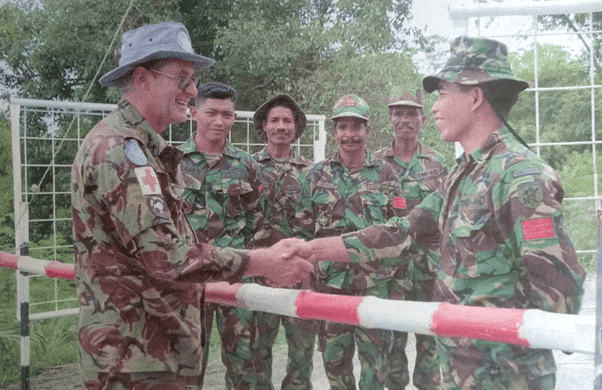
When I was young, I lived next door to a man who served in World War 2. He had a heart of gold, would do anything for you, and yes, protect you to the end if he thought you needed it. He was also a heavy drinker, and when he went on a bender, it was serious, because he suffered from, as we called it back then, “Shell shock”. Unfortunately, the coping mechanism he used to deal with the trauma caused him even more trauma. One day, he took shelter under our hedge from the bombs. The ambulance came and took him away.
Fast forward to 2000; I was taking shelter behind a sandbag wall at an Irish outpost high in the hills of East Timor. Rebel fighters had been spotted down the valley, and they were making their way towards us. The main platoon guarding our post were patrolling a short distance away, so it’s fair to say we were somewhat vulnerable until they got back. The soldiers remaining were more the “housekeeping staff” rather than a fearsome fighting force, and I was visiting the camp providing a morale boost and providing support as best I could. The Irish chef turned to me and said “Did ya be bringin’ ya rifle with ya, Padre, because best ya be getting’ it ready! – we need all the help we can get, and I’m not sure praying is going to do the job”!
Now I couldn’t possibly put down in writing whether I had my rifle with me or not; being a non-combatant, and what’s more, a chaplain, carrying a weapon would pose all manner of difficult issues. But there I was, behind the sandbags, and let’s just say that what I had in my hands wasn’t a hymn book… And we waited. And waited. And nothing happened. No gunshots, no grenades; nothing like the shell shock experienced by soldiers in combat, nor by my next- door neighbour.
So I was puzzled as to why, after my return home, I had symptoms of Post Traumatic Stress Disorder (PTSD). I knew what it was, because ironically, I was a bit of an expert on PTSD and it was my job to help the soldiers with theirs. And I knew how to get help for it. But there were all sorts of reasons that I didn’t, or couldn’t, get the help. For one thing, I was sure I really didn’t need it – not when compared to the combat troops, so I soldiered on; then “civilianed on” after leaving the military. Until it caught up with me, a few years later.
Fast forward to today. I’m reading an article on PTSD about veterans from Iraq and Afghanistan, and it points out that these modern conflicts “present a unique set of circumstances that contribute heavily to mental health problems.” It goes on to say that the uncertainty caused by guerilla attacks, roadside i.e.ds (bombs) and the lack of distinction between safe zones and battle zones, may trigger more PTSD in veterans than conventional fighting. I’ve long since believed that was the case for me, and for others involved in peacekeeping missions. Where there is always the possibility of a confrontation or an attack; people are always on guard, literally ready for fight-or-flight all the time, and feeling more vulnerable in a large crowd at a village market than in the jungle. Checking escape routes everywhere you go, on the lookout for weapons that may be concealed, watching for suspicious behaviour, taking your rifle to the toilet with you, and yes, going to sleep with your weapon ready and by your side. It might not ever happen… but it might, and you have to be prepared for it.
The good news for me is that I did seek and receive help; I signed up with Veterans’ Affairs and I officially hold a War Disability pension of “zero dollars”, because it doesn’t affect my day-to-day living. And I have a treatment card that automatically reactivates if I have any trouble in the future. The best part is, I have a diagnosis of “Mild PTSD”, so I have documented proof that I’m only “mildly crazy”; have you?
More information here: https://europepmc.org/article/med/27757001